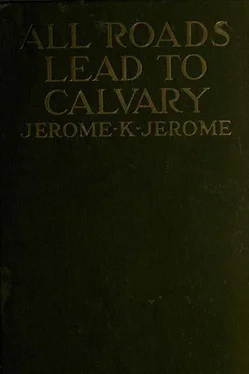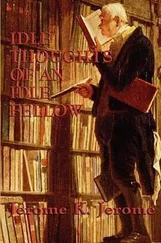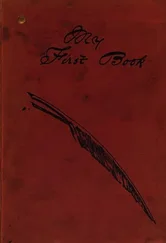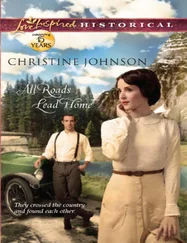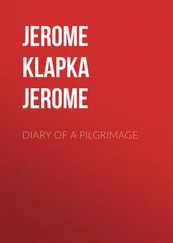Jerome Jerome - All Roads Lead to Calvary
Здесь есть возможность читать онлайн «Jerome Jerome - All Roads Lead to Calvary» весь текст электронной книги совершенно бесплатно (целиком полную версию без сокращений). В некоторых случаях можно слушать аудио, скачать через торрент в формате fb2 и присутствует краткое содержание. Город: London, Год выпуска: 1919, Издательство: Hutchinson & Co., Жанр: Классическая проза, на английском языке. Описание произведения, (предисловие) а так же отзывы посетителей доступны на портале библиотеки ЛибКат.
- Название:All Roads Lead to Calvary
- Автор:
- Издательство:Hutchinson & Co.
- Жанр:
- Год:1919
- Город:London
- ISBN:нет данных
- Рейтинг книги:3 / 5. Голосов: 1
-
Избранное:Добавить в избранное
- Отзывы:
-
Ваша оценка:
- 60
- 1
- 2
- 3
- 4
- 5
All Roads Lead to Calvary: краткое содержание, описание и аннотация
Предлагаем к чтению аннотацию, описание, краткое содержание или предисловие (зависит от того, что написал сам автор книги «All Roads Lead to Calvary»). Если вы не нашли необходимую информацию о книге — напишите в комментариях, мы постараемся отыскать её.
All Roads Lead to Calvary — читать онлайн бесплатно полную книгу (весь текст) целиком
Ниже представлен текст книги, разбитый по страницам. Система сохранения места последней прочитанной страницы, позволяет с удобством читать онлайн бесплатно книгу «All Roads Lead to Calvary», без необходимости каждый раз заново искать на чём Вы остановились. Поставьте закладку, и сможете в любой момент перейти на страницу, на которой закончили чтение.
Интервал:
Закладка:
She had sent a note by messenger to Mary Stopperton to say she was coming. Mary had looked very fragile the last time she had seen her, just before leaving for France; and she had felt a fear. Mary had answered in her neat, thin, quavering writing, asking her to come early in the morning. Sometimes she was a little tired and had to lie down again. She had been waiting for Joan. She had a present for her.
The morning promised to be fair, and she decided to walk by way of the Embankment. The great river with its deep, strong patience had always been a friend to her. It was Sunday and the city was still sleeping. The pale December sun rose above the mist as she reached the corner of Westminster Bridge, turning the river into silver and flooding the silent streets with a soft, white, tender light.
The tower of Chelsea Church brought back to her remembrance of the wheezy old clergyman who had preached there that Sunday evening, that now seemed so long ago, when her footsteps had first taken her that way by chance. Always she had intended making inquiries and discovering his name. Why had she never done so? It would surely have been easy. He was someone she had known as a child. She had become quite convinced of that. She could see his face close to hers as if he had lifted her up in his arms and was smiling at her. But pride and power had looked out of his eyes then.
It was earlier than the time she had fixed in her own mind and, pausing with her elbows resting on the granite parapet, she watched the ceaseless waters returning to the sea, bearing their burden of impurities.
“All roads lead to Calvary.” It was curious how the words had dwelt with her, till gradually they had become a part of her creed. She remembered how at first they had seemed to her a threat chilling her with fear. They had grown to be a promise, a hope held out to all. The road to Calvary! It was the road to life. By the giving up of self we gained God.
And suddenly a great peace came to her. One was not alone in the fight, God was with us: the great Comrade. The evil and the cruelty all round her: she was no longer afraid of it. God was coming. Beyond the menace of the passing day, black with the war’s foul aftermath of evil dreams and hatreds, she saw the breaking of the distant dawn. The devil should not always triumph. God was gathering His labourers.
God was conquering. Unceasing through the ages, God’s voice had crept round man, seeking entry. Through the long darkness of that dim beginning, when man knew no law but self, unceasing God had striven: until at last one here and there, emerging from the brute, had heard — had listened to the voice of love and pity, and in that hour, unknowing, had built to God a temple in the wilderness.
Labourers together with God. The mighty host of those who through the ages had heard the voice of God and had made answer. The men and women in all lands who had made room in their hearts for God. Still nameless, scattered, unknown to one another: still powerless as yet against the world’s foul law of hate, they should continue to increase and multiply, until one day they should speak with God’s voice and should be heard. And a new world should be created.
God. The tireless Spirit of eternal creation, the Spirit of Love. What else was it that out of formlessness had shaped the spheres, had planned the orbits of the suns. The law of gravity we named it. What was it but another name for Love, the yearning of like for like, the calling to one another of the stars. What else but Love had made the worlds, had gathered together the waters, had fashioned the dry land. The cohesion of elements, so we explained it. The clinging of like to like. The brotherhood of the atoms.
God. The Eternal Creator. Out of matter, lifeless void, he had moulded His worlds, had ordered His endless firmament. It was finished. The greater task remained: the Universe of mind, of soul. Out of man it should be created. God in man and man in God: made in like image: fellow labourers together with one another: together they should build it. Out of the senseless strife and discord, above the chaos and the tumult should be heard the new command: “Let there be Love.”
The striking of the old church clock recalled her to herself. But she had only a few minutes’ walk before her. Mary had given up her Church work. It included the cleaning, and she had found it beyond her failing strength. But she still lived in the tiny cottage behind its long strip of garden. The door yielded to Joan’s touch: it was seldom fast closed. And knowing Mary’s ways, she entered without knocking and pushed it to behind her, leaving it still ajar.
And as she did so, it seemed to her that someone passing breathed upon her lips a little kiss: and for a while she did not move. Then, treading softly, she looked into the room.
It welcomed her, as always, with its smile of cosy neatness. The spotless curtains that were Mary’s pride: the gay flowers in the window, to which she had given children’s names: the few poor pieces of furniture, polished with much loving labour: the shining grate: the foolish china dogs and the little china house between them on the mantelpiece. The fire was burning brightly, and the kettle was singing on the hob.
Mary’s work was finished. She sat upright in her straight-backed chair before the table, her eyes half closed. It seemed so odd to see those little work-worn hands idle upon her lap.
Joan’s present lay on the table near to her, as if she had just folded it and placed it there: the little cap and the fine robe of lawn: as if for a king’s child.
Joan had never thought that Death could be so beautiful. It was as if some friend had looked in at the door, and, seeing her so tired, had taken the work gently from her hands, and had folded them upon her lap. And she had yielded with a smile.
Joan heard a faint rustle and looked up. A woman had entered. It was the girl she had met there on a Christmas Day, a Miss Ensor. Joan had met her once or twice since then. She was still in the chorus. Neither of them spoke for a few minutes.
“I have been expecting every morning to find her gone,” said the girl. “I think she only waited to finish this.” She gently unfolded the fine lawn robe, and they saw the delicate insertion and the wonderful, embroidery.
“I asked her once,” said the girl, “why she wasted so much work on them. They were mostly only for poor people. ‘One never knows, dearie,’ she answered, with that childish smile of hers. ‘It may be for a little Christ.’”
They would not let less loving hands come near her.
Her father had completed his business, and both were glad to leave London. She had a sense of something sinister, foreboding, casting its shadow on the sordid, unclean streets, the neglected buildings falling into disrepair. A lurking savagery, a half-veiled enmity seemed to be stealing among the people. The town’s mad lust for pleasure: its fierce, unjoyous laughter: its desire ever to be in crowds as if afraid of itself: its orgies of eating and drinking: its animal-like indifference to the misery and death that lay but a little way beyond its own horizon! She dared not remember history. Perhaps it would pass.
The long, slow journey tried her father’s strength, and assuming an authority to which he yielded obedience tempered by grumbling, Joan sent him to bed, and would not let him come down till Christmas Day. The big, square house was on the outskirts of the town where it was quiet, and in the afternoon they walked in the garden sheltered behind its high brick wall.
He told her of what had been done at the works. Arthur’s plan had succeeded. It might not be the last word, but at least it was on the road to the right end. The men had been brought into it and shared the management. And the disasters predicted had proved groundless.
Читать дальшеИнтервал:
Закладка:
Похожие книги на «All Roads Lead to Calvary»
Представляем Вашему вниманию похожие книги на «All Roads Lead to Calvary» списком для выбора. Мы отобрали схожую по названию и смыслу литературу в надежде предоставить читателям больше вариантов отыскать новые, интересные, ещё непрочитанные произведения.
Обсуждение, отзывы о книге «All Roads Lead to Calvary» и просто собственные мнения читателей. Оставьте ваши комментарии, напишите, что Вы думаете о произведении, его смысле или главных героях. Укажите что конкретно понравилось, а что нет, и почему Вы так считаете.
